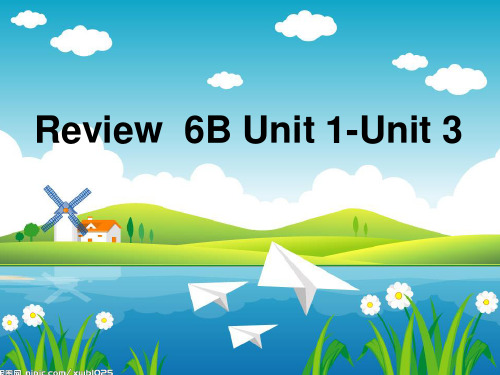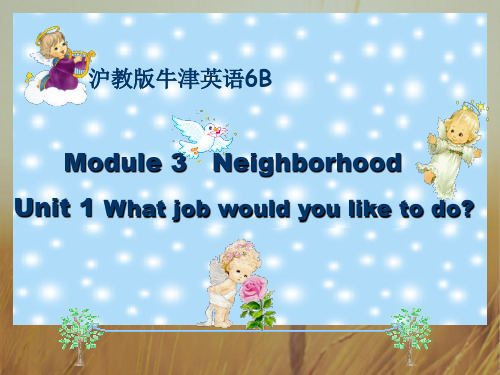2019-2020年牛津英语上海版六年级下册6BModule1Unit3TheDragonBoatFestival4课时教案附反思
牛津英语小学六年级下册英语6B Unit 1-Unit 3 Review课件

National Hotel
Train station
Jiefang Road
( 3 kilometres)
A: I want to visit Yao Ming and Liu Xiang. How can I __g_e_t _ _to____ the National Hotel?
B: You can __ta_k_e__ bus No.10 at the train station and get off __a_t__ _t_h_e___ _fi_ft_h___ stop. There’s a bus _e_v_e_r_y_ five minutes.
Liu Xiang is good at running. He runs very fast.
Yao Ming is good at playing basketball. He jumps very high. A : Who jumps lower, Yao Ming or Liu Xiang ? B : Liu Xiang jumps lower than Yao Ming. A : Does Yao Ming run faster than Liu xiang ? B : No , he doesn’t.
old older young younger big bigger
fat fatter late later
heavy heavier
early earlier far farther 用所给词的正确形式填空
well better
1.She swims __fa_s_te_r (fast ) than me.
知识小点拨:
形容词和副词有原级和比较级之分,当 两者进行比较的时候,就要用比较级。 当在as…as中间的时候就要用原级。
最新-六年级英语下册 6B Module3 Unit1课件 沪教牛津版 精品

cook food for people; work many hours in a kitchen fly an aeroplane
make Garden City a safe place
do business work in an office help businessmen or businesswomen; put out fires catch fish; like to eat fish bring letters and parcels to people
• Questions: Name; Age; Job; Like or not; Why; When to start work; When to finish work
…is…old. He/she is a … He/she (dis)likes … because … He/she doesn’t like…because… He/she starts …..and finish…
What’s your name? How old are you? What job do you do? Do you like your job? Why? What time do you start work? What time do you finish work?
P45(E)
A Survey
Look and learn:
secretary
businesswoman
busiRead, think and say:
• Cook • • Pilot • Policeman/ • policewoman • Businessman/ • businesswoman • Secretary • • Fireman • Fisherman • • Postman
(完整版)上海版牛津英语六年级下册6B重点知识点复习整理(最新整理)

(完整版)上海版牛津英语六年级下册6B重点知识点复习整理(最新整理)上海版牛津英语六年级下册6B重点知识点复习整理Module 1 City LifeUnit 1 Great cities in Asia【知识点梳理】1.方位词:east / west / north / south / north-east / north-west / south-east / south-west用法:a. 两地不相邻: e.g. A is north B. (= to the south of)b. 两地接壤: e.g. A is on the north of B.c. 所属关系,A包含B, B属于A: e.g. B is in the north of A.2. by + 交通工具表示“乘……交通工具”, 用how进行提问e.g. by bus / ferry / train / ship / underground… by plane = by air, by ship = by sea3. How far…多远(询问距离的远近,路程的长短)e.g. Hoe far is it from your home to school? 从你家到学校有多远?4. How long…多长,多久(询问时间的长短,提问一段时间)e.g. How long does it take to travel from Shanghai to Beijing by train? 坐火车从上海到北京要花多长时间?5. It takes (sb.) some time to do sth. 做某事需要花费多少时间e.g. It takes me five hours to make this modal plane. 做这个模型飞机花了我5个小时。
6. like / love / enjoy doing sth. 喜欢做某事e.g. The people in Bangkok like / love / enjoy eating spicy food. 曼谷人喜欢吃辛辣食物。
【最新】牛津英语上海版六年级下册知识点整理

牛津英语上海版六年级下册知识点整理Module1City lifeUnit1Great cities in Asian词组:the capital of... ...的首都north-east东北from...to...从...到...in the past在过去the Great Wall长城more than=over超过eat dumpling吃饺子 tall buildings高楼大厦huge department stores大型的百货商店a lot of许多语法点:1.Beijing is north of Shanghai.北京在上海的北部。
(1)两地不相邻:A is north of B.(2)所属关系:A is in the north of B.(3)两地接壤:A is on the north of B.2.How far is it from Shanghai to Beijing?从北京到上海有多远?How far...多远。
询问距离的远近,路程的长远。
3.How long does it take to travel from Shanghai to Beijing by train?坐火车从上海到北京要多久?(1)How long...多久。
询问时间长短。
How long…多长。
用于询物的问长度。
(2)by+交通工具,表示“乘...交通工具”,用How提问。
4.It takes about ten hours.大约需要十小时It takes(sb.)st.to do sth.做某事需要花费多长时间。
5.They enjoy eating dumplings.他们喜欢吃饺子enjoy/like/love doing sth.喜欢做某事6.Two and a half days=Two days and a half两天半Half an hour=one and a half hours=one/an hour and a half一个半小时Unit2At the airport词组:plane ticket机票silk scarf丝巾 a lot of/plenty of大量的,许多departure time出发时间leave for出发去某地 have to不得不be going to将要arrive at到达boarding card登机牌name tap姓名语法点:1.Aunt Judy and Uncle Mike have lived in Los Angeles for six years.朱迪婶婶和迈克叔叔在洛杉矶已住了六年。
上海牛津英语六年级第二学期6B英语知识点汇总U1-U9[2]
![上海牛津英语六年级第二学期6B英语知识点汇总U1-U9[2]](https://img.taocdn.com/s3/m/50c711bc0b1c59eef9c7b4cf.png)
上海牛津英语六年级第二学期6B英语知识点汇总U1-U9(word版可编辑修改)编辑整理:尊敬的读者朋友们:这里是精品文档编辑中心,本文档内容是由我和我的同事精心编辑整理后发布的,发布之前我们对文中内容进行仔细校对,但是难免会有疏漏的地方,但是任然希望(上海牛津英语六年级第二学期6B英语知识点汇总U1-U9(word版可编辑修改))的内容能够给您的工作和学习带来便利。
同时也真诚的希望收到您的建议和反馈,这将是我们进步的源泉,前进的动力。
本文可编辑可修改,如果觉得对您有帮助请收藏以便随时查阅,最后祝您生活愉快业绩进步,以下为上海牛津英语六年级第二学期6B英语知识点汇总U1-U9(word版可编辑修改)的全部内容。
六年级第二学期牛津英语知识点梳理Unit One Great cities in Asia打*的知识点仅供参考知识点梳理:I 词组1. at an exhibition 在展览会上2. the capital of China 中国的首都3. north-east of Shanghai 在上海东北面east/ west/ south / north of 在……的东、西、南、北面north—east /north—west of 在……的东北、西北south—east /south- west of 在……东南,西南* in/on/to the east ofeg。
Shanghai is in the east of China.Korea is on the east of China。
Japan is to the east of China。
3. how far 多远4。
how 如何/怎样5. how long 多久6. in the past 在过去7. other places 其他城市8。
from shanghai to Beijing 从上海到北京9。
read some information about Beijing 阅读关于北京的信息10。
六年级下册英语Module 1 Unit 3 Our school in the future 牛津上海版(三起)

(1)I got up at about 6 in the morning last Saturday. ( F ) (2)I did some exercise last Sunday. ( F ) (3)I made some egg pies by myself. ( T ) (4)We played cards last Sunday. ( T ) (5)Mike was so sad. (T )
Sally's school is big. The playground is big. Students can run and play there. The library is big and new. Students can read all kinds of books in it. There is a garden. But it is very small.
A. will gives
B. will give
C. gives
5. In the future, school will __C__ different.
A. is
B. are
C. be
6. Robot will help us __A__ books in the library.
A. find
wing
6. bank
back
7. in
ink
8. seem
sing
Play a game
watch TV
go shopping
sing songs
take photos
every day yesterday next week now
I
they
he
六年级下册英语课件-Module 1 Unit 3 Our school in the future | 牛津上海版
Think and say
Students will ...
Students will not ... I will be ...
Guess and say
schools of the
future
Think and say
In the future, schools will be ______.
get information
make phone calls play games
read news
go shopping send messages
enjoy music
take lessons
read ebooks
have a chat
watch sport matches
Think and say
Read and complete
We use __b_o_o_k_s___ in our lessons now.
In the future, we will use _c_o_m__p_u_te_r_s__ in all our lessons.
Think and say What else can you do with computers?
Oxford English
Our school in the future
Period 2
Look and say
have a picnic / go on a picnic
Look and say
grow a plant
Read aloud
Read aloud
Students will have a picnic every month. Students will study online at home.
六年级下册英语ppt课件-Module-1-Unit-3-牛津上海版(三起)
will be going to
will not/won’t be not going to
8
The simple future tense
tomorrow next Monday/week/... in the future in the future this evening/Sunday/...
32
Look and say
上海教育出版社 六年级 | 下册
33
上海教育出版社 六年级 | 下册
Homework
Complete the letter and read it aloud. 把这封信完成并大声读出来。
34
31
Read and think
上海教育出版社 六年级 | 下册
Last week, I flew a kite in the park. I fly a kite in the park every weekend. Next week, I will fly a kite in the park.
Think and say
In the future, schools will be different.
20
Where will schools be?
上海教育出版社 六年级 | 下册
They will be under the sea, on high mountains and even in space.
上海教育出版社 六年级 | 下册
Module 1 Unit 3
Our school in the future
1
Think and say
My school in the past
In the past, our school was ... There was/were ... There wasn’t/weren’t ... Students ...
沪教版六年级英语下册(上海牛津6B)知识点总结
lazy
懒惰的
take off
脱掉
roof
屋顶
yard
院子
hit
碰撞
see the world
见世面
one by one
一个接一个地
look out of
往外看
even
甚至
themselves
他们自己
sweep
扫地
space
太空
theatre
剧院
broom
扫帚
dinosaur
恐龙
go fishing
去钓鱼
drive
驾驶
a piece of
一张
enjoy oneself
玩得愉快
street sweeper
环卫工人
have a picnic
去野餐
get…in
收割
油
craft
手艺,工艺
long race
长跑
oil painting
油画
crown
王冠
short race
短跑
powerful
强有力的
scissors
剪刀
win
获胜
ink
墨水
tape
胶带
long jump
跳远
brush
画笔,刷子
glue
胶水
high jump
跳高
paints
绘画颜料
saw
锯
swimsuit
kilogram
千克,公斤
writer
作家
online
在线的
centimeter
厘米
photographer
六年级英语下册 6B Module3 Unit1课件 沪教牛津版 精
Doctor Yes
What time do you finish work?
Why/why not? want to make sick
people better
Starts at 7:30 a.m.
Finishes at 8:00 p.m.
P45(A)
Look and read:
• Questions: Name; Age; Job; Like or not; Why; When to start work; When to finish work
…is…old. He/she is a … He/she (dis)likes … because … He/she doesn’t like…because… He/she starts …..and finish…
What’s your name? How old are you? What job do you do? Do you like your job? Why? What time do you start work? What time do you finish work?
P45(B)
Look and read:
What’s your name? How old are you? What job do you do? Do you like your job? Why? What time do you start work? What time do you finish work?
P45(E)
A Survey
cook food for people; work many hours in a kitchen fly an aeroplane
- 1、下载文档前请自行甄别文档内容的完整性,平台不提供额外的编辑、内容补充、找答案等附加服务。
- 2、"仅部分预览"的文档,不可在线预览部分如存在完整性等问题,可反馈申请退款(可完整预览的文档不适用该条件!)。
- 3、如文档侵犯您的权益,请联系客服反馈,我们会尽快为您处理(人工客服工作时间:9:00-18:30)。
2019-2020年牛津英语上海版六年级下册6BModule1Unit3TheDragonBoatFestival4课时教案附反思2019-2020年牛津英语上海版六年级下册6BModule1Unit3TheDragonBoatFestival4课时教案附反思(一)知识与技能1熟练掌握连词but 的用法。
2掌握介词with, without 的用法.3运用一般过去时描述过去发生的事情。
(二)过程与方法1用“Wh-”问句引出有关端午节的话题.e.g. When is the Dragon Boat Festival?What do people eat?Why do we celebrate the festival?2使用情态动词would操练句型Would you like…?Yes, please./ No, thanks.3使用一般现在时表达自己的好恶e.g. don’t like/hate/love4 Using modals to indicate preferencese.g. I would rather have…(三)情感、态度与价值观1学习一系列与中国传统节日:端午节,有关的信息,了解本国的风土人情,拓宽知识面,1)了解端午节的来历。
2)了解中国人如何庆祝端午节。
2唤醒学生保护中国传统节日的强烈责任感。
Period 1Language focus:Using adjectives to describe objectse.g. a salty rice dumping/a sweet rice dumplingUsing prepositions to indicate timee.g …in summer. It’s on the fifth day of the fifth lunar month…Asking ‘Wh-‘questions to find out various kinds of specific information about a persone.g. What do people eat /What do people do to celebrate this festivalUsing connectives to link contrasting idease.g. Kitty loves the sweet rice dumplings, but she hates the salty ones.Using the simple present tense to express preferencese.g. loves/hates/likesUsing prepositional phrases to describe objectse.g. salty ones with meat and green beans/sweet ones without red beansPre-task preparation1Ask students what they like to do and eat to celebrate the Dragon Boat Festival. Encourage students to talk about this festival.2Review and introduce new vocabulary items in Look and learn.3Play the recording: Look and learn and Look and read. Students listen and follow in their books. 4Play the recording again. Students listen and repeat.While-task procedure1Students pair up to talk about the rice dumplings they like. Have them complete the survey form in Circle and write by circling and writing down what they have discussed with their partners. They are required to use the target language in their report, like this: I love…, but I hate …/My classmate loves…, but …/We both love…, but…2Ask individuals to read their reports to the class.3Collect all reports and bind them into a book for circulation in class.4Conduct a simple survey to find out the most popular kind of rice dumpling among students by counting how many students like a particular kind of rice dumpling. Ask some students why they like or dislike a particular kind of rice dumpling.ConsolidationGrammar Practice Book 7A pages 9 and 10Period 2Language focus:Asking ‘wh-‘questions to find out the reasone.g. Why do we celebrate the Dragon Boat FestivalUsing the simple past tense to talk about past activities and statese.g. Qu-yuan was born around two thousand years ago in China.Using the simple present tense to talk about present statese.g. Nowadays, people eat rice dumplings and have Dragon Boat races to …Pre-task preparationLanguage learning activity(This section aims at providing students with opportunities to practise the language/vocabulary needed or become familiar with the background for the task that follows.)1 Give students some time to read the story silently. Then ask students: Was Qu-yuan sad Why Encourage volunteers to answer the questions.2 Play the recording: Look and read. Students listen and follow in their books.3 Play the recording again. Students listen and repeat. Ask students to pay attention to the pronunciation and intonation of the words4 Remind students of the use of the past tense in the story .Go over the verbs in the past tense withstudents. Invite the more able students to speak out and spell, if possible, the corresponding verbs in their present tense form.5 Remind students to pay attention to the use of different tenses when talking about the past and the present in the story.6 Distribute a copy of photocopiable page 8 to each student. Students read the text on page 11 of the Student’s Book again individually. Have them complete the list and write down the answers to the questions.7 To check the answers with students, invite some students to write the list on the board. Then invite the more able students to answer the questions orally.ConsolidationGrammar Practice Book 7A pages 12Period 3Language focus:Using modals to make an offere.g. Would you like a piece of rice dumplingUsing formulaic expressions to accept offerse.g. Yes, please. I really like rice dumplings.Using formulaic expressions to decline offerse.g. No, thanks. I don’t like rice dumplings very much.Using modals to indicate preferencese.g. I’d rather have a piece of pizza.Pre-task preparationLanguage learning activity(This section aims at providing students with opportunities to practise the language/vocabulary needed or become familiar with the background for the task that follows.)1 Review the names of the food and drink items that students have learned previously, e.g. pizza, pancake, cookies, hamburger, lemonade, 7-UP, coffee, etc. Introduce new food items, e.g. Chinese pudding, Christmas pudding with the help of pictures or photos.2 Play the recording: Look and say. Students listen and follow in their books.3 Students work in groups of three and use the modeled conversation in About you to do the role-play. Have some groups come out and act the conversation.ConsolidationGrammar Practice Book 7A Page 13Period 4Language focus:Using formulaic expressions to begin and end a lettere.g. Dear _____/Yours,Using the simple present tense to express interestse.g. don’t like/hate/loveUsing prepositions to describe objectse.g. I hate the sweet ones with/without…Using modals to indicate preferencese.g. I would rather have…Pre-task preparationReview the format of a letter with students. Tell students that a letter should include the date, receiver’s name and address, greeting, body, complimentary close and writer’s signature. Remind students that there are different letter formats and that it is acceptable to indent the paragraphs.While-task procedure1 Have students look at Think and write on Page 13 of the Student’s Book. Students are required to complete the letter to a pen-friend, telling him/her about the Dragon Boat Festival. Remind them they also have to read pages 10 and 12 of the Student’s Book again in order to find all the relevant information.2 When the students have completed their letters, invite a few more able student to read their letters aloud.ConsolidationGrammar Practice Book 7A page 15NOTES: (单元教后记)本单元通过学习一系列与中国传统节日:端午节,有关的信息,了解本国的风土人情,拓宽知识面,唤醒学生保护中国传统节日的强烈责任感。
